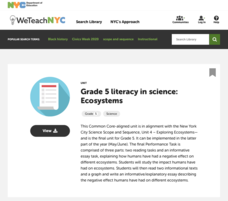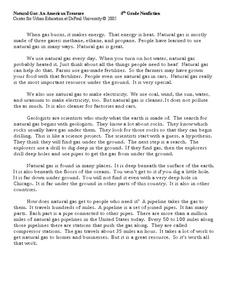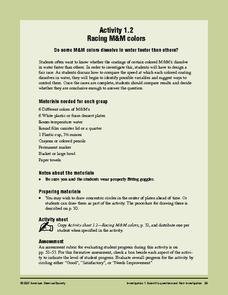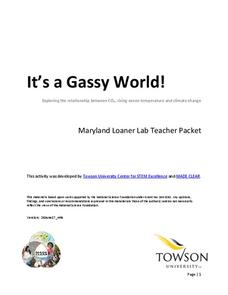Curated OER
Adding & Subtracting (Combining) Integers
Maintain a positive atmosphere in your math class with this fun lesson on adding and subtracting integers. After first explaining the rules for combining positive and negative numbers, this resource uses a comic strip...
EngageNY
Proof of the Pythagorean Theorem
What does similarity have to do with the Pythagorean Theorem? The activity steps through the proof of the Pythagorean Theorem by using similar triangles. Next, the teacher leads a discussion of the proof and follows it by an animated...
National Research Center for Career and Technical Education
Break-Even Point
How do companies determine the prices of their products? Marketing maestros discover the concepts of cost and break-even point through discussion, independent practice, and a collaborative assessment. The career and technology-oriented...
New York City Department of Education
Grade 5 Literacy in Science: Ecosytems
How do humans affect ecosystems? Learners read two articles and interpret a graph to develop essays on the human impact on ecosystems. They read about human impact on tigers and manatees as a basis for their overarching papers.
E Reading Worksheets
Main Idea Worksheet 4
Does your class or do individual learners need more practice determining the main idea of a passage of informational text? Here is a learning exercise containing seven exercises that asks kids to read short paragraphs, summarize the...
Curated OER
Natural Gas: An American Treasure
Do your fourth graders need extra practice with evaluating fact and opinion? An informative resource provides two reading passages in which learners distinguish sentences as fact or as opinion. Additionally,...
English Worksheets Land
Out to Lunch
Enhance instruction and practice reading with a worksheet that doesn't just ask scholars to identify a sentence's point of view, but also poses the question, How do you know?
Prestwick House
Fahrenheit 451—Activity Pack
The burning questions is at what point do readers of Fahrenheit 451 recognize the many literary devices Ray Bradbury employs in his dystopian classic that warns of a society that uses media to indoctrinate the public and denigrates...
Curated OER
The Present Tense (Part 1)
This resource examines the present tense through several mediums. The information covered includes: regular present tense verbs, stem-changing present tense verbs, irregular present tense verbs, and use of the present tense. Included is...
Kentucky Adult Education
Probability Lesson Plan
Roll the dice with this multimedia math lesson on probability. After first viewing a series of three short videos explaining probability, independent events, and dependent events, young mathematicians complete a set...
SaveandInvest.org
Introduction to Earning Interest: Grades 9-10
Does your bank pay you for allowing them to hold your money? The lesson covers three different ways your money can make money. Topics include certificates of deposit, statement savings accounts, and money market accounts.
Baylor College
Your Energy Needs (BMR)
How many Calories one needs on a daily basis is dependent on a number of factors including gender, height, and activity level. In the third of seven lessons about energy and food, young nutritionists calculate the number of Calories...
Positively Autism
"Saying 'No, Thank You'" Social Skills Story
Teach learners to use polite words when they do not want something, rather than being rude or aggressive, using these simple presentation slides. The presentation walks students step by step through what it means to say "No,...
Palomar College
Making Yes/No Questions in the Present Tense
Does your class need some practice with writing yes or no questions in the present tense? This worksheet offers learners some choice as they pair activities with subjects to form questions. Pupils also write a quick response to each...
Discovery Education
Urinalysis
What do lab tests reveal about a patient's health? Scholars perform a simulated urinalysis on two different patients by testing color, pH, glucose levels, and protein levels. Then, they compare their findings to what they know passes...
Baylor College
Water in Your Body
Do you know how much water you have had in the last 24 hours? Do you know how much your body needs? For this hands-on activity, your class members will estimate how much water our bodies lose each day by filling and emptying one-liter...
Baylor College
Energy for Life (Energy from Food)
Energy comes in many forms, but how do living things get the energy they need to survive and thrive? In a simple, controlled experiment with yeast, water, and sugar, groups make observations about how yeast reacts with water alone, then...
Curated OER
Periodic Table of Fun
Are you looking to put the fun back in the fundamentals of chemistry? Why not have groups create their own periodic tables of something (animals, food, music groups, etc.) practicing the organizational strategies used in the periodic...
iCivics
Why Government?
Why do people create governments? Where did we get our ideas about government? This is a fantastic introductory lesson for your American government class that begins by reviewing the philosophies of Thomas Hobbes and John Locke in...
California Academy of Science
Be Prepared for an Earthquake
Earthquakes can be frightening and dangerous, but being prepared can make a world of difference. Perform an earthquake simulation during which the class practices how to drop, cover, and hold on as you read a script...
American Chemical Society
Racing M&M Colors
More than anything, this is great practice in scientific inquiry. After discovering that the color coating of an M&M® dissolves in water during a preceding activity, investigators now question whether or not the color makes a...
Towson University
It's a Gassy World!
How much does your class know about the relationship between climate change and carbon dioxide? Science scholars explore the nature of greenhouse gases and rising ocean temperature through demonstrations, research, and experiments. The...
Missouri Department of Elementary
I Know What You Did This Summer
Developing and maintaining healthy interpersonal relationships is difficult, especially as middle schoolers begin dating. A short activity permits eighth graders to practice their skills as they consider how they should respond to a...
K12 Reader
The Spy Will Try Not to Cry
Learn all about the exploits of a sly spy from the short poem included on this resource. The poem, intended to provide practice with long /i/ words that use the letter y, is paired with three reading comprehension questions for pupils to...























